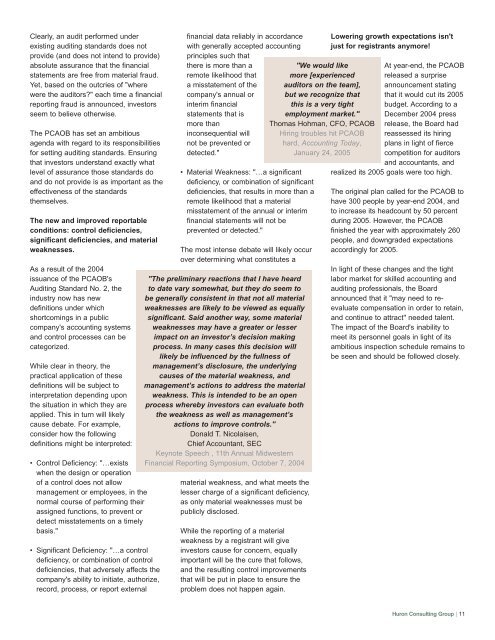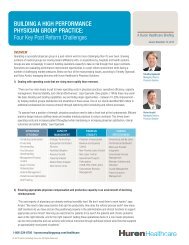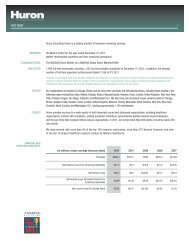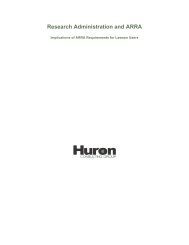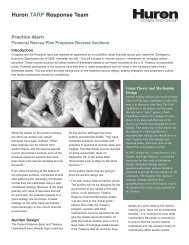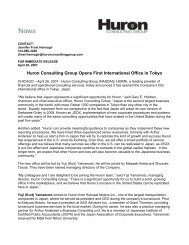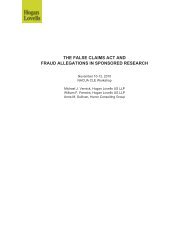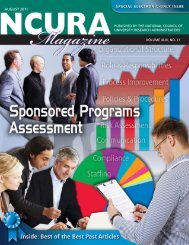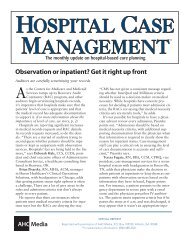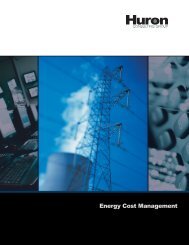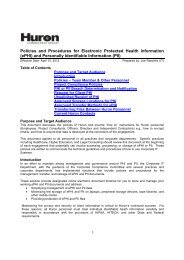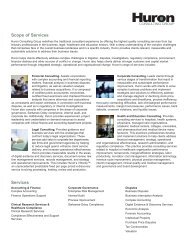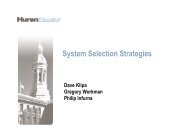2004 Annual Review of Financial Reporting Matters - Huron ...
2004 Annual Review of Financial Reporting Matters - Huron ...
2004 Annual Review of Financial Reporting Matters - Huron ...
Create successful ePaper yourself
Turn your PDF publications into a flip-book with our unique Google optimized e-Paper software.
Clearly, an audit performed under<br />
existing auditing standards does not<br />
provide (and does not intend to provide)<br />
absolute assurance that the financial<br />
statements are free from material fraud.<br />
Yet, based on the outcries <strong>of</strong> "where<br />
were the auditors" each time a financial<br />
reporting fraud is announced, investors<br />
seem to believe otherwise.<br />
The PCAOB has set an ambitious<br />
agenda with regard to its responsibilities<br />
for setting auditing standards. Ensuring<br />
that investors understand exactly what<br />
level <strong>of</strong> assurance those standards do<br />
and do not provide is as important as the<br />
effectiveness <strong>of</strong> the standards<br />
themselves.<br />
The new and improved reportable<br />
conditions: control deficiencies,<br />
significant deficiencies, and material<br />
weaknesses.<br />
As a result <strong>of</strong> the <strong>2004</strong><br />
issuance <strong>of</strong> the PCAOB's<br />
Auditing Standard No. 2, the<br />
industry now has new<br />
definitions under which<br />
shortcomings in a public<br />
company's accounting systems<br />
and control processes can be<br />
categorized.<br />
While clear in theory, the<br />
practical application <strong>of</strong> these<br />
definitions will be subject to<br />
interpretation depending upon<br />
the situation in which they are<br />
applied. This in turn will likely<br />
cause debate. For example,<br />
consider how the following<br />
definitions might be interpreted:<br />
• Control Deficiency: "…exists<br />
when the design or operation<br />
<strong>of</strong> a control does not allow<br />
management or employees, in the<br />
normal course <strong>of</strong> performing their<br />
assigned functions, to prevent or<br />
detect misstatements on a timely<br />
basis."<br />
• Significant Deficiency: "…a control<br />
deficiency, or combination <strong>of</strong> control<br />
deficiencies, that adversely affects the<br />
company's ability to initiate, authorize,<br />
record, process, or report external<br />
financial data reliably in accordance<br />
with generally accepted accounting<br />
principles such that<br />
there is more than a<br />
remote likelihood that<br />
a misstatement <strong>of</strong> the<br />
company's annual or<br />
interim financial<br />
statements that is<br />
more than<br />
inconsequential will<br />
not be prevented or<br />
detected."<br />
• Material Weakness: "…a significant<br />
deficiency, or combination <strong>of</strong> significant<br />
deficiencies, that results in more than a<br />
remote likelihood that a material<br />
misstatement <strong>of</strong> the annual or interim<br />
financial statements will not be<br />
prevented or detected."<br />
The most intense debate will likely occur<br />
over determining what constitutes a<br />
"The preliminary reactions that I have heard<br />
to date vary somewhat, but they do seem to<br />
be generally consistent in that not all material<br />
weaknesses are likely to be viewed as equally<br />
significant. Said another way, some material<br />
weaknesses may have a greater or lesser<br />
impact on an investor’s decision making<br />
process. In many cases this decision will<br />
likely be influenced by the fullness <strong>of</strong><br />
management’s disclosure, the underlying<br />
causes <strong>of</strong> the material weakness, and<br />
management’s actions to address the material<br />
weakness. This is intended to be an open<br />
process whereby investors can evaluate both<br />
the weakness as well as management’s<br />
actions to improve controls."<br />
Donald T. Nicolaisen,<br />
Chief Accountant, SEC<br />
Keynote Speech , 11th <strong>Annual</strong> Midwestern<br />
<strong>Financial</strong> <strong>Reporting</strong> Symposium, October 7, <strong>2004</strong><br />
material weakness, and what meets the<br />
lesser charge <strong>of</strong> a significant deficiency,<br />
as only material weaknesses must be<br />
publicly disclosed.<br />
While the reporting <strong>of</strong> a material<br />
weakness by a registrant will give<br />
investors cause for concern, equally<br />
important will be the cure that follows,<br />
and the resulting control improvements<br />
that will be put in place to ensure the<br />
problem does not happen again.<br />
"We would like<br />
more [experienced<br />
auditors on the team],<br />
but we recognize that<br />
this is a very tight<br />
employment market."<br />
Thomas Hohman, CFO, PCAOB<br />
Hiring troubles hit PCAOB<br />
hard, Accounting Today,<br />
January 24, 2005<br />
Lowering growth expectations isn't<br />
just for registrants anymore!<br />
At year-end, the PCAOB<br />
released a surprise<br />
announcement stating<br />
that it would cut its 2005<br />
budget. According to a<br />
December <strong>2004</strong> press<br />
release, the Board had<br />
reassessed its hiring<br />
plans in light <strong>of</strong> fierce<br />
competition for auditors<br />
and accountants, and<br />
realized its 2005 goals were too high.<br />
The original plan called for the PCAOB to<br />
have 300 people by year-end <strong>2004</strong>, and<br />
to increase its headcount by 50 percent<br />
during 2005. However, the PCAOB<br />
finished the year with approximately 260<br />
people, and downgraded expectations<br />
accordingly for 2005.<br />
In light <strong>of</strong> these changes and the tight<br />
labor market for skilled accounting and<br />
auditing pr<strong>of</strong>essionals, the Board<br />
announced that it "may need to reevaluate<br />
compensation in order to retain,<br />
and continue to attract" needed talent.<br />
The impact <strong>of</strong> the Board's inability to<br />
meet its personnel goals in light <strong>of</strong> its<br />
ambitious inspection schedule remains to<br />
be seen and should be followed closely.<br />
<strong>Huron</strong> Consulting Group | 11


